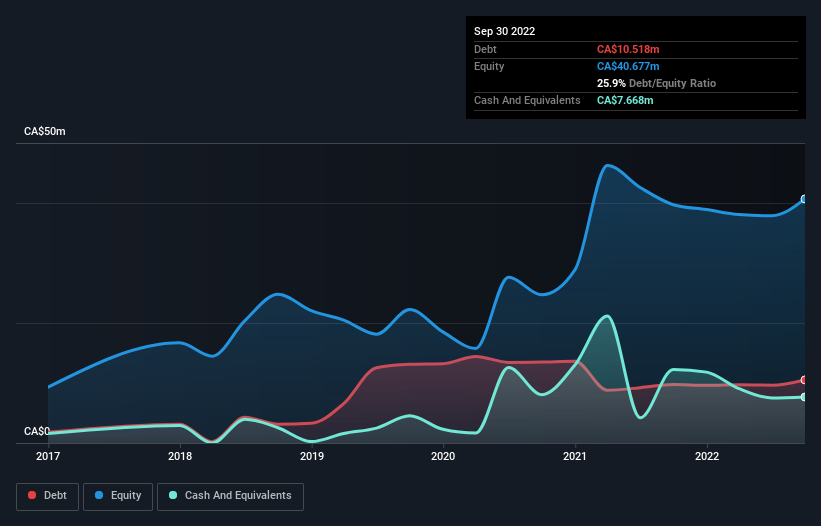Would Rubicon Organics (CVE:ROMJ) Be Better Off With Less Debt?
Warren Buffett famously said, 'Volatility is far from synonymous with risk.' It's only natural to consider a company's balance sheet when you examine how risky it is, since debt is often involved when a business collapses. As with many other companies Rubicon Organics Inc. (CVE:ROMJ) makes use of debt. But should shareholders be worried about its use of debt?
When Is Debt Dangerous?
Debt assists a business until the business has trouble paying it off, either with new capital or with free cash flow. In the worst case scenario, a company can go bankrupt if it cannot pay its creditors. However, a more usual (but still expensive) situation is where a company must dilute shareholders at a cheap share price simply to get debt under control. By replacing dilution, though, debt can be an extremely good tool for businesses that need capital to invest in growth at high rates of return. The first step when considering a company's debt levels is to consider its cash and debt together.
See our latest analysis for Rubicon Organics
How Much Debt Does Rubicon Organics Carry?
The image below, which you can click on for greater detail, shows that at September 2022 Rubicon Organics had debt of CA$10.5m, up from CA$9.73m in one year. On the flip side, it has CA$7.67m in cash leading to net debt of about CA$2.85m.

How Strong Is Rubicon Organics' Balance Sheet?
The latest balance sheet data shows that Rubicon Organics had liabilities of CA$6.99m due within a year, and liabilities of CA$9.80m falling due after that. On the other hand, it had cash of CA$7.67m and CA$4.50m worth of receivables due within a year. So its liabilities total CA$4.62m more than the combination of its cash and short-term receivables.
Given Rubicon Organics has a market capitalization of CA$50.5m, it's hard to believe these liabilities pose much threat. However, we do think it is worth keeping an eye on its balance sheet strength, as it may change over time. The balance sheet is clearly the area to focus on when you are analysing debt. But ultimately the future profitability of the business will decide if Rubicon Organics can strengthen its balance sheet over time. So if you're focused on the future you can check out this free report showing analyst profit forecasts.
In the last year Rubicon Organics wasn't profitable at an EBIT level, but managed to grow its revenue by 52%, to CA$31m. With any luck the company will be able to grow its way to profitability.
Caveat Emptor
While we can certainly appreciate Rubicon Organics's revenue growth, its earnings before interest and tax (EBIT) loss is not ideal. Indeed, it lost CA$1.1m at the EBIT level. Considering that alongside the liabilities mentioned above does not give us much confidence that company should be using so much debt. Quite frankly we think the balance sheet is far from match-fit, although it could be improved with time. Another cause for caution is that is bled CA$4.4m in negative free cash flow over the last twelve months. So suffice it to say we consider the stock very risky. The balance sheet is clearly the area to focus on when you are analysing debt. But ultimately, every company can contain risks that exist outside of the balance sheet. Be aware that Rubicon Organics is showing 2 warning signs in our investment analysis , and 1 of those is concerning...
Of course, if you're the type of investor who prefers buying stocks without the burden of debt, then don't hesitate to discover our exclusive list of net cash growth stocks, today.
New: AI Stock Screener & Alerts
Our new AI Stock Screener scans the market every day to uncover opportunities.
• Dividend Powerhouses (3%+ Yield)
• Undervalued Small Caps with Insider Buying
• High growth Tech and AI Companies
Or build your own from over 50 metrics.
Have feedback on this article? Concerned about the content? Get in touch with us directly. Alternatively, email editorial-team (at) simplywallst.com.
This article by Simply Wall St is general in nature. We provide commentary based on historical data and analyst forecasts only using an unbiased methodology and our articles are not intended to be financial advice. It does not constitute a recommendation to buy or sell any stock, and does not take account of your objectives, or your financial situation. We aim to bring you long-term focused analysis driven by fundamental data. Note that our analysis may not factor in the latest price-sensitive company announcements or qualitative material. Simply Wall St has no position in any stocks mentioned.
About TSXV:ROMJ
Rubicon Organics
Engages in the production, processing, and sale of organic cannabis for the recreational and medical-use markets in Canada and internationally.
Flawless balance sheet and good value.
Market Insights
Community Narratives


Recently Updated Narratives

Constellation Energy Dividends and Growth

CoreWeave's Revenue Expected to Rocket 77.88% in 5-Year Forecast

Bisalloy Steel Group will shine with a projected profit margin increase of 12.8%
Popular Narratives


MicroVision will explode future revenue by 380.37% with a vision towards success


NVDA: Expanding AI Demand Will Drive Major Data Center Investments Through 2026



